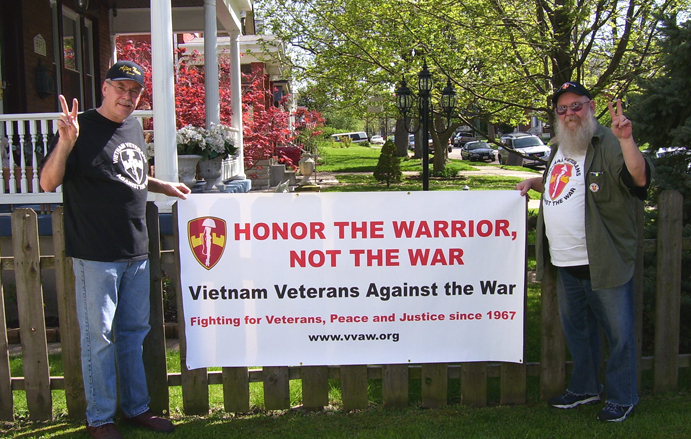 |
VVAW Growing in CincinnatiBy Marty WebsterSince I became the VVAW contact for Cincinnati, a lot of exciting things have happened. Our first VVAW event was on November 19 and 20, when we joined VVAW contact Mark Hartford and the Columbus, Ohio VVAW for two showings of Winter Soldier at Ohio State University's Wexner Center for the Arts. The events were well attended, and discussions followed each showing. Members of Veterans for Peace and Military Families Speak Out also participated. In January, we attended a memorial and interment service for Specialist Douglas Barber near Cincinnati. He was an Iraq veteran who suffered from post-traumatic stress disorder (PTSD), and because of the ongoing failure of the VA to adequately address his issues, he was no longer able to cope. Tragically, he took his own life on January 16 in Alabama. On February 4, we were invited to set up a table and say a few words at a "Day of Dialogue on Iraq" by Reverend Benjamin J. Urmston, director of the Xavier University peace and justice programs. The event was a dialogue between Adeed I. Dawisha, a professor of political science at Miami University (Ohio) and Ray McGovern, an Army officer and CIA analyst. Dawisha represented the point of view that the United States must stay in Iraq until Iraq is able to protect itself. McGovern argued that by invading Iraq, the United States launched a war of aggression (defined by Nuremberg as "the supreme international crime"), and said that troops must be withdrawn immediately. On Presidents' Day, we participated in a "constitutional vigil" in front of the Federal Building in Cincinnati. This was part of a series of events organized by MoveOn to bear witness to the president's lawbreaking and increase the pressure on Congress to do something about it. In March, we set up a table outside the Tangeman University Center at the University of Cincinnati during a presentation by retired general Wesley Clark on national security and veterans' issues. The Hamilton County Democratic Party sponsored the event. Later in March, we were invited to participate in a discussion on a veterans' outreach program at a luncheon in Louisville.
From April 7 to 13, VVAW participated in ten showings of Winter Soldier at the University of Cincinnati, which were sponsored by the Cincinnati Film Society. We had only two days' advance notice to prepare, and attendance was sparse for the first few showings. However, word of mouth about the film spread quickly. The attendees were riveted as they viewed the eyewitnesses' testimony on war crimes and atrocities. The film evokes all of the sorrow and pain that Vietnam has come to represent. Because of intense student interest and the interest of Steve Sunderland (a UC peace studies professor and the director of the Peace Village), VVAW has been invited to sponsor a two-day showing of Winter Soldier in May. Robert Harris (community relations co-coordinator for the National Conference for Community and Justice of Greater Cincinnati) and Stewart Newstate (a retired investigator for the Ohio Civil Rights Commission) have agreed to help with the publicity and arrangements. I moderated and gave a brief synopsis of the Winter Soldier investigation and the background of the film. The documentary not only exposes war crimes, but it also gives us an insight into the effects of PTSD on Vietnam veterans, and I spoke about Douglas Barber's funeral, noting that Iraq war veterans also experience PTSD. Discussions followed each session. "I know this girl, and she just signed up, and she really wants to change her mind," said one fellow. "So many of my buddies are coming back, and they are different," added another. "I don't quite understand it; they don't seem to want to talk about it." I spoke about how war changes us, usually with long-lasting effects. I explained to the group how VVAW was in the forefront in getting our government and the VA to recognize the seriousness of PTSD in returning veterans, and said that sometimes symptoms don't appear until years later. One evening after the theater had been locked, the custodian heard the conversation and said he had done six years in the Army. "This isn't about 1972; it's about 2006," he added. VVAW has also attended and participated in various candlelight peace vigils and demonstrations in the Ohio Valley area. There is much interest in rejuvenating the VVAW presence in Cincinnati. I am officially announcing the Ohio Valley regional chapter of VVAW. This will cover southern Ohio and parts of Kentucky and southern Indiana, and we hope groups will form new chapters in these areas. Marty Webster is a Vietnam-era veteran who served in a naval hospital during the war. He experienced the results of war firsthand from a medical perspective, treating young men who came back from Vietnam with facial wounds and burns. Marty also worked with TDRLs and medevacs and on escort duty. Like countless others, he suffers from post-traumatic stress disorder. Marty is the VVAW regional contact for Cincinnati, Ohio.
|


